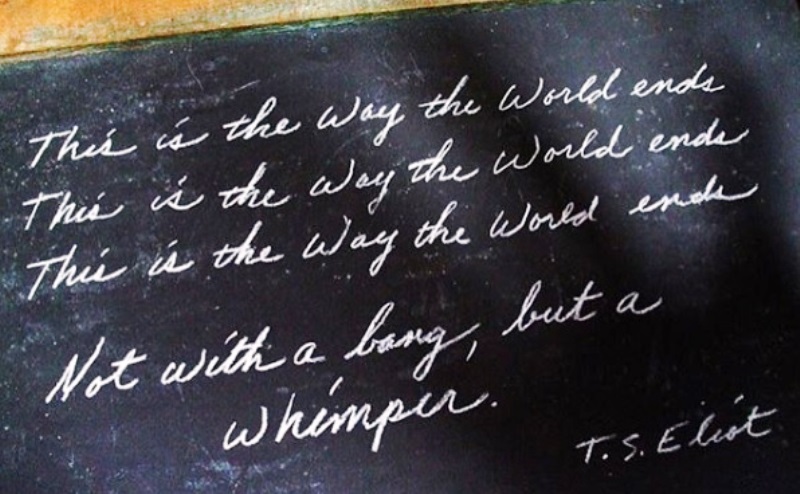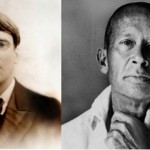According to Poetry Foundation,
When T. S. Eliot died, wrote Robert Giroux, “the world became a lesser place.” Certainly the most imposing poet of his time, Eliot was revered by Igor Stravinsky “not only as a great sorcerer of words but as the very key keeper of the language.” For Alfred Kazin he was “the mana known as ‘T. S. Eliot,’ the model poet of our time, the most cited poet and incarnation of literary correctness in the English-speaking world.” Northrop Frye simply states: “A thorough knowledge of Eliot is compulsory for anyone interested in contemporary literature. Whether he is liked or disliked is of no importance, but he must be read.”
In 1945 Eliot wrote: “A poet must take as his material his own language as it is actually spoken around him.” Correlatively, the duty of the poet, as Eliot emphasized in a 1943 lecture, “is only indirectly to the people: his direct duty is to his language, first to preserve, and second to extend and improve.” Thus he dismisses the so-called “social function” of poetry. The only “method,” Eliot once wrote, is “to be very intelligent.” As a result, his poetry “has all the advantages of a highly critical habit of mind,” writes A. Alvarez; “there is a coolness in the midst of involvement; he uses texts exactly for his own purpose; he is not carried away. Hence the completeness and inviolability of the poems. What he does in them can be taken no further…. [One gets] the impression that anything he turned his attention to he would perform with equal distinction.” Alvarez believes that “the strength of Eliot’s intelligence lies in its training; it is the product of a perfectly orthodox academic education.” But Jacques Maritain once told Marshall McLuhan that “Eliot knows so much philosophy and theology that I do not see how he can write poetry at all.” Eliot, however, never recognized a conflict between academic and creative pursuits.
Suggested read: Don’t Tell Me You Love Me; Show Me You Do!
Someone Who Dared To Disturb The Universe: Best Poems by T.S. Eliot
Here are some of the best poems by T.S. Eliot.
- Miss Helen
Miss Helen Slingsby was my maiden aunt,
And lived in a small house near a fashionable square
Cared for by servants to the number of four.
Now when she died there was silence in heaven
And silence at her end of the street.
The shutters were drawn and the undertaker wiped his feet —
He was aware that this sort of thing had occurred before.
The dogs were handsomely provided for,
But shortly afterwards the parrot died too.
The Dresden clock continued ticking on the mantelpiece,
And the footman sat upon the dining-table
Holding the second housemaid on his knees —
Who had always been so careful while her mistress lived.
- The Boston Evening Transcript
The readers of the Boston Evening Transcript
Sway in the wind like a field of ripe corn.
When evening quickens faintly in the street,
Wakening the appetites of life in some
And to others bringing the Boston Evening Transcript,
I mount the steps and ring the bell, turning
Wearily, as one would turn to nod good-bye to Rochefoucauld,
If the street were time and he at the end of the street,
And I say, “Cousin Harriet, here is the Boston Evening Transcript.“
Suggested read: “I Passed Into The Dusk”: Some Of The Best Works By Ivor Gurney
- Cousin Nancy
Miss Nancy Ellicott
Strode across the hills and broke them,
Rode across the hills and broke them —
The barren New England hills —
Riding to hounds
Over the cow-pasture.
Miss Nancy Ellicott smoked
And danced all the modern dances;
And her aunts were not quite sure how they felt about it,
But they knew that it was modern.
Upon the glazen shelves kept watch
Matthew and Waldo, guardians of the faith,
The army of unalterable law.
- Gerontion
Thou hast nor youth nor age
But as it were an after dinner sleep
Dreaming of both.
Here I am, an old man in a dry month,
Being read to by a boy, waiting for rain.
I was neither at the hot gates
Nor fought in the warm rain
Nor knee deep in the salt marsh, heaving a cutlass,
Bitten by flies, fought.
My house is a decayed house,
And the Jew squats on the window sill, the owner,
Spawned in some estaminet of Antwerp,
Blistered in Brussels, patched and peeled in London.
The goat coughs at night in the field overhead;
Rocks, moss, stonecrop, iron, merds.
The woman keeps the kitchen, makes tea,
Sneezes at evening, poking the peevish gutter.
I an old man,
A dull head among windy spaces.
Signs are taken for wonders. ‘We would see a sign!’
The word within a word, unable to speak a word,
Swaddled with darkness. In the juvescence of the year
Came Christ the tiger
In depraved May, dogwood and chestnut, flowering judas,
To be eaten, to be divided, to be drunk
Among whispers; by Mr. Silvero
With caressing hands, at Limoges
Who walked all night in the next room;
By Hakagawa, bowing among the Titians;
By Madame de Tornquist, in the dark room
Shifting the candles; Fräulein von Kulp
Who turned in the hall, one hand on the door.
Vacant shuttles
Weave the wind. I have no ghosts,
An old man in a draughty house
Under a windy knob.
After such knowledge, what forgiveness? Think now
History has many cunning passages, contrived corridors
And issues, deceives with whispering ambitions,
Guides us by vanities. Think now
She gives when our attention is distracted
And what she gives, gives with such supple confusions
That the giving famishes the craving. Gives too late
What’s not believed in, or is still believed,
In memory only, reconsidered passion. Gives too soon
Into weak hands, what’s thought can be dispensed with
Till the refusal propagates a fear. Think
Neither fear nor courage saves us. Unnatural vices
Are fathered by our heroism. Virtues
Are forced upon us by our impudent crimes.
These tears are shaken from the wrath-bearing tree.
The tiger springs in the new year. Us he devours. Think at last
We have not reached conclusion, when I
Stiffen in a rented house. Think at last
I have not made this show purposelessly
And it is not by any concitation
Of the backward devils.
I would meet you upon this honestly.
I that was near your heart was removed therefrom
To lose beauty in terror, terror in inquisition.
I have lost my passion: why should I need to keep it
Since what is kept must be adulterated?
I have lost my sight, smell, hearing, taste and touch:
How should I use it for your closer contact?
These with a thousand small deliberations
Protract the profit of their chilled delirium,
Excite the membrane, when the sense has cooled,
With pungent sauces, multiply variety
In a wilderness of mirrors. What will the spider do
Suspend its operations, will the weevil
Delay? De Bailhache, Fresca, Mrs. Cammel, whirled
Beyond the circuit of the shuddering Bear
In fractured atoms. Gull against the wind, in the windy straits
Of Belle Isle, or running on the Horn,
White feathers in the snow, the Gulf claims,
And an old man driven by the Trades
To a sleepy corner.
Tenants of the house,
Thoughts of a dry brain in a dry season.
- Hysteria
As she laughed I was aware of becoming involved in her laughter and being part of it, until her teeth were only accidental stars with a talent for squad-drill. I was drawn in by short gasps, inhaled at each momentary recovery, lost finally in the dark caverns of her throat, bruised by the ripple of unseen muscles. An elderly waiter with trembling hands was hurriedly spreading a pink and white checked cloth over the rusty green iron table, saying: “If the lady and gentleman wish to take their tea in the garden, if the lady and gentleman wish to take their tea in the garden …” I decided that if the shaking of her breasts could be stopped, some of the fragments of the afternoon might be collected, and I concentrated my attention with careful subtlety to this end.
Suggested read: A Conqueror Of All Things Misogynistic, Here’s Why Blythe Baird’s Poetry Matters
This is all we have on today’s post on the Best Poems By T.S. Eliot. This is, however, not an exhaustive list, and if we have missed out on some of your favorites, then please feel free to add them in the comment section below.
Until next time!
Featured image source: Instagram













